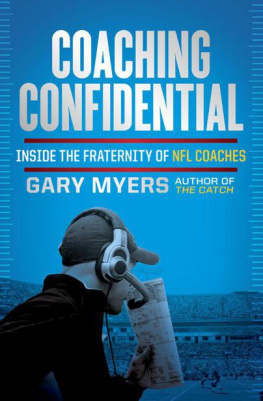Visit Tyndales exciting Web site at www.tyndale.com.
TYNDALE and Tyndales quill logo are registered trademarks of Tyndale House Publishers, Inc.
UnCommon and Dare to Be UnCommon are trademarks of Tyndale House Publishers, Inc.
Uncommon: Finding Your Path to Significance
Copyright 2009, 2011 by Tony Dungy. All rights reserved .
Cover photo copyright 2008 by Brian MacDonald. All rights reserved.
Designed by Dean H. Renninger
Published in association with the literary agency of Legacy, LLC, Winter Park, Florida 32789.
Unless otherwise indicated, all Scripture quotations are taken from the Holy Bible , New Living Translation, copyright 1996, 2004, 2007 by Tyndale House Foundation. Used by permission of Tyndale House Publishers, Inc., Carol Stream, Illinois 60188. All rights reserved.
Scripture quotations marked NIV are taken from the Holy Bible, New International Version, NIV. Copyright 1973, 1978, 1984 by Biblica, Inc. Used by permission of Zondervan. All rights reserved worldwide. www.zondervan.com.
Uncommon copyright 2009 Songs for Delaney/ASCAP. All rights reserved. Used with permission.
Library of Congress Cataloging-in-Publication Data
Dungy, Tony.
Uncommon : finding your path to significance / Tony Dungy with Nathan Whitaker.
p. cm.
ISBN 978-1-4143-2681-8 (hc)
1.Conduct of life. 2.Dungy, Tony. 3.Football coachesUnited StatesAnecdotes.
I.Whitaker, Nathan. II.Title.
BJ1581.2.D864 2009
170'.44dc22 2008046798
ISBN 978-1-4143-2682-5 (sc)
Build: 2014-01-27 08:25:35
To my sons, that they might continue
on their journey to becoming uncommon men.
TONY DUNGY
To my daughters, that they might hold out for someday spending their lives with uncommon men.
NATHAN WHITAKER
ACKNOWLEDGMENTS
The authors gratefully acknowledge the contributions of many who have gone before, those who built into our lives and made this book and its contents possible. In particular, we are grateful for the time and input of Jim Caldwell, Mark Merrill, John Ondrasik, Ken Whitten, and Alan Williams.
Once again, the good people of Tyndale House Publishers, including Lisa Jackson, Jan Long Harris, and Doug Knox, were tremendously helpful in seeing this project through, as was our literary agent, D. J. Snell.
We are especially thankful for Lauren, Amy, and our families, who allowed us the time to undertake yet another book on a tight schedule. And finally, we are grateful to our fathers: to Scott Whitaker, for modeling these uncommon qualities to Nathan and assisting with his part of the manuscript; and to Wilbur Dungy, whose uncommon life provided the impetus for this project and whose spirit guided it throughout.
INTRODUCTION
Not all those who wander are lost.
J. R. R. TOLKIEN
Since coming to Indianapolis, I have become friends with two young men. Although they grew up fairly close to each other, they were raised under very different circumstances, in totally different environments. Brandon Robinson is white. He grew up in a two-parent home in rural Indiana. Dallas Clifton is black and was raised by his mother in the heart of Indianapolis.
Despite these different backgrounds, however, both boys have a lot in common. Both are extremely bright and articulate and have fun, engaging personalities. Both are good hearted and good lookingthe type of young men you hope your daughter will bring home one day. But Brandon and Dallas also have one more thing in common. Both are in prisonthe result of making poor decisions they will regret the rest of their lives.
Sadly, stories like Brandons and Dallass are becoming more and more common today. In Marion County, Indiana, which includes the city of Indianapolis, there were 8,949 juvenile arrests in 2007. In other words, an average of twenty-five teenagers were arrested on any given day for crimes ranging from disorderly conduct to robbery and aggravated assault. When I hear these statistics, my thoughts immediately turn to the scourge of gangs or to street kids without positive direction. But through Brandon and Dallas, Ive learned that is not necessarily the case.
Dan and Cheryl Robinson raised Brandon in a very quiet neighborhood in Warsaw, Indiana. According to Brandon, they were very loving and supportive, wanted the best for him, and tried to keep him away from anything that might hinder his development. Despite the fact that he grew up in what would probably be considered ideal conditions, Brandon began rebelling against his parents authority.
Brandon began experimenting with marijuana and alcohol. It all seemed like harmless fun for him and his buddies, and he enjoyed his status as the guy with the fake ID who could get the alcohol for his underage friends. Harmless fun, that is, until one summer night when he was driving the guys home after drinking.
It was just a short ride on a road Brandon knew very well. But that night he failed to stop at a stop sign; entered the intersection at sixty miles per hour in his dual-wheeled, extended-cab pickup truck; hit a car; and killed three people, seriously injuring two others. His actionsand their tragic effectswere caused by a blood alcohol level of at least 0.099 percent, well above Indianas legal limit of 0.08 percent. He was convicted of three counts of driving while intoxicated causing death and two counts of driving while intoxicated causing serious bodily injury. The judge sentenced him to twenty-eight years in prison.
The lives of three people ended that night, and the lives of the two surviving passengers, as well as all the families, forever changed at that moment.
Dallass story is different, yet the same. From the very start, Alicia Clifton knew Dallas was special. Dallass sister played the piano, and he often imitated her. By the time he was four, he was playing with both hands, and when he started taking lessons, he progressed faster than anyone could believe. By fifteen, he was playing classical music, writing his own songs, and winning numerous talent contests in and around Indianapolis.
Alicia encouraged Dallas to develop his talent, but she also wanted him to stay grounded in his Christian faith. When he began playing keyboards for several local church choirs, it seemed the ideal way for him to do both.
After a while, however, Alicia began to worry about Dallas. She knew he was paid well for his playing, but he seemed to have too much money at times. Where was he getting it? The answer, she later found out, was through gambling.
The gambling started in elementary school when the older kids taught him how to play a game called tonk. Soon the penny-ante card games gave way to dice. Craps was easy for Dallas, and he could turn $50 he received from playing at a wedding into $150 or $200 in what seemed like minutes. On top of that, gambling was fun, a real adrenaline rush when things were going well. Of course, Dallas didnt always win, but he always made up those occasional losses the next time. And the winning made a lot of good things happenhe could help his mother pay the bills and buy some nice things for his sisters. He had money to spend on new clothes and gifts for girls, which made him even more popular at school.
When Alicia eventually found out where this extra money was coming from, she warned Dallas about the decisions he was making and the chances he was taking with his life. But everything was going so well for Dallas, he was sure his mom was worrying for no reason.




![Whitaker Nathan - The mentor leader: [secrets to building people and teams that win consistently]](/uploads/posts/book/228009/thumbs/whitaker-nathan-the-mentor-leader-secrets-to.jpg)




